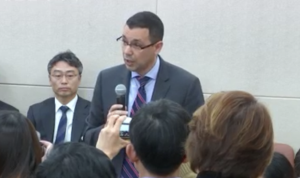At a parliamentary audit by the Health and Welfare Committee, lawmakers were quick to accuse multinational pharmaceuticals of setting prices of novel drugs high in the Korean market.
However, Avi BenShoshan, chairman of the Korea Research-based Pharma Industry Association (KRPIA), remained calm as he replied to questions of the lawmakers.

Rep. Choi Do-ja of the minor conservative Bareunmirae Party called on BenShoshan as a witness to the National Assembly on Monday, inquiring mostly on expensive medicines by multinational drug firms and suspicions over alleged tax evasions.
“There are many drugs crucial to saving the life that multinational pharmaceutical firms do not even import into Korea. Nor have these companies bothered to apply for insurance coverage,” Choi said. “Out of the 318 orphan drugs, they do not distribute 76 medicines (23.9 percent) in the local market. An additional 14 medications (4.3 percent) have not been approved.”
Choi pointed out that KRPIA maintained the average drug price in Korea at only 45 percent of the average of that among members of the Organization for Economic Cooperation and Development (OECD).
“Multinational pharmaceuticals say they cannot seek health insurance for their drugs because the Korean government sets their drug prices too low. Do you think drug prices in Korea are lower than those in other countries,” Choi asked BenShoshan.
In a reply, BenShoshan said he was well aware of such concerns. “There were times when patients were not able to access novel drugs. But our group’s mission is to help patients have the best results of R&D,” he said.
He went on to say that the situation had a room for improvement. “Our association will actively find a measure to deal with this issue. But we need cooperation from the National Assembly and the government,” he added.
Choi also raised suspicion over multinational drugmakers’ alleged tax evasions.
“While multinational firms said their earnings were poor only in Korea, media reports raised suspicion that the drug companies intentionally set the manufacturing costs high to evade taxes here,” Choi said.
BenShoshan said he was unaware of such news reports. “Multinational pharmaceuticals are complying with the local laws and the association’s regulations,” he said. “I will review related articles and reports and reply to your question again.”
Rep. Ki Dong-min of the ruling Democratic Party inquired about whether multinational pharmaceuticals were making unfairly high profits in Korea.
“Koreans have ambivalent views on global pharmaceutical firms. One is that they make up for what the local pharmaceutical industry lacks, and the other is that they are taking excessive profits from the Korean market,” Ki said. “This is why the KRPIA should be able to explain about drug prices and the manufacturing costs to Korean consumers.”
BenShoshan said the KRPIA’s priority was to ensure that patients have prompt access to innovative medicines. “To do so, we are aggressively cooperating with government agencies,” he said.
However, Health and Welfare Minister Park Neung-hoo gave a different interpretation.
“Cooperation is a double-edged sword. Multinationals demand high drug pricing instead of providing fast access to new drugs. In the process, the government struggles to achieve both – the quick access to new drugs and stable drug prices,” Park said.
Park went on to say that because the Korean government controls drug prices under the national health insurance system, a drug price in Korea could become a standard drug price in advanced countries.
“By conducting an extensive study, the government will base the local study results, not the results of the studies by multinational drug firm, to negotiate drug prices,” he added.

